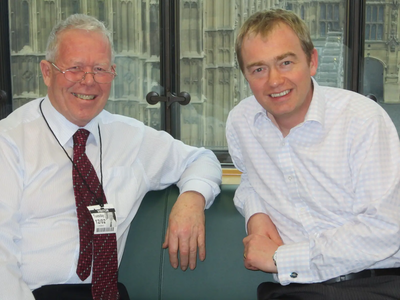Farron meets Natural England Chair to call for action on South Lakes flooding

Cumbrian MP, Tim Farron, this afternoon met with the Chair of Natural England, Poul Christensen, to ask Natural England to help tackle the ongoing flooding issues experienced by residents and farmers across the South Lakes following several years of poor weather.
Several sites across South Lakeland, most notably the River Kent and its tributaries have been designated Sites of Special Scientific Interests (SSSIs), meaning that they have been deemed among the country's 4,100 best wildlife and geological sites. As a result they are given extra protections against development, pollution and unsustainable land management.
However along the River Kent and its tributaries, such as the River Mint, this has meant that maintenance of the river has been restricted - this in turn has led to water levels rising as much as three feet leading to serious flooding problems in Kendal, neighbouring villages and on farm land. Tim pressed Mr Christensen to look into this specific case to see if the restrictions could be eased to enable land owners and farmers to remove sediment once a year in order to prevent flooding which affects residential and agricultural areas.
Mr Christensen agreed to look into the issue to see if there was a solution that could be found to help local residents and farmers.
Commenting Tim said: "Many families have seen their lives turned upside down by flooding in recent years. In some cases, this could have been avoided if only maintenance of our local rivers was permitted.
"I want to help residents and farmers along the Kent and its tributaries to be able to prevent the worst of the flooding by tackling the rising river levels and I am very grateful that Poul has agreed to look into this issue to see what we can do to combat this specific problem and protect our farms and villages."